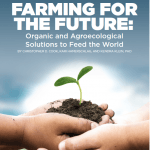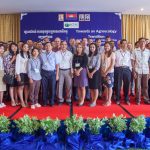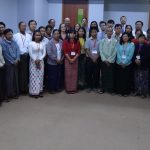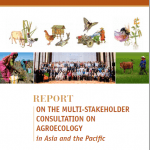9 downloads
Title of document: Crop protection and pesticide risk assessment Myanmar: towards sustainable agricultural and export of high value crops Authors: Peeters, F.M.; Meggelen, J. van; Schepers, H.T.A.M. in Alterra Report Ministry/Government Agency/Organisation: Year of publication: 2015 Geographic focus: Myanmar Url original document: https://www.wageningenur.nl/nl/Publicatie-details.htm?publicationId=publication-way-343835323638 Summary: The government of Myanmar and the Netherlands intend to start a partnership programme in different agricultural sectors, including horticulture. The Dutch Ministry of economic Affairs has fielded a technical expert mission in October 2014 to assess the potentials for growth and development in the vegetable, fruit and flower sub-sectors. In this context the Dutch ministry of Economic Affairs aims to assist Myanmar towards sustainable agricultural production and increased exports of high value crops. Investment in an integrated programme on Plant Health, including Integrated Crop Management and Pesticide Risk Reduction will result in an improved balance between benefits and risks of agricultural production in Myanmar. An expert team of the Netherlands existing of experts of Alterra and PPO of Wageninggen-UR and the NVWA have visited Myanmar (3-8 November, 2014). The objective of their mission was to provide clear strategic and operational directions for further development of an Integrated Crop Management and Pesticide Risk Reduction programme in Myanmar. Read More

10 downloads
Title of document: FARMING FOR THE FUTURE: Organic and Agroecological Solutions to Feed the World Authors: CHRISTOPHER D. COOK, KARI HAMERSCHLAG, AND KENDRA KLEIN Ministry/Government Agency/Organisation: Friends of the Earth Year of publication: 2016 Geographic focus: World / USA Url original document: http://webiva-downton.s3.amazonaws.com/877/05/5/8492/2/FOE_Farming_for_the_Future_Final.pdf Summary: Hunger is not primarily a problem of overall supply of food, but rather of poverty, lack of democracy and unequal access to land, water and other resources, especially for women, states a new report on organic and ecological solutions. This report cites that four decades of scientific evidence show that agroecological farming is the most effective agricultural response to the environmental challenges that threaten our future food security, such as climate change, soil erosion, water scarcity and loss of biodiversity. The report debunks three dominant myths about food, farming and hunger that keep society on the path of business as usual and offers agroecological solutions for a more sustainable and just foundation for our food future. It cities extensive evidence of the agroecology’s successin reducing poverty and producing ample harvests while protecting human and ecological health in both developed and developing countries. Read More
9 downloads
Title of document: Case study on Bamboo marketing in Lao PDR Authors: Latsamy Boupha, Phongxiong Wanneng, Bouakhet Sayasouk, and Bouavieng Souphanthong Ministry/Government Agency/Organisation: ICRAF/NUOL Year of publication: 2006 Geographic focus: Laos Url original document: https://www.google.la/?gws_rd=cr&ei=oAE0WN6UDMfsvATvrKewDw#q=Case+study+on+Bamboo+marketing+in+Lao+PDR Summary: Bamboo is non timber forest product, which can found in the tropical and sub-tropical zones. It is fast growing and easy regeneration species. Bamboo is a desirable plant for sustainable management; it has important direct and indirect economic and environmental benefits such as providing shoot for food, culms for housing, furniture, handicraft products and soil and water conservation. Bamboo can play an important role in the reduction of wood consumption, environmental and forest protection, poverty alleviation and sustainable development of rural economy. Read More
3 downloads
Title of document: Myanmar’s Agriculture Sector: Unlocking the Potential for Inclusive Growth Authors: David A. Raitzer, Larry C.Y. Wong, and Jindra Nuella G. Samson in ADB Economics Working Paper series Ministry/Government Agency/Organisation: ADB Year of publication: 2015 Geographic focus: Myanmar Url original document: https://openaccess.adb.org/bitstream/handle/11540/5300/EWP_470_MYA%20Agriculture_14Dec_WEB.pdf?sequence=1 Summary: Myanmar’s agriculture sector offers substantial unexploited potential to underpin the country’s inclusive economic development. With extensive land, water, and labor resources, as well as proximity to fast-growing markets, the country’s agriculture has key competitive advantages. At the same time, Myanmar’s agricultural productivity trails its neighbors as a result of constraints in input markets, infrastructure, and institutions. Key actions to address these constraints include improving land tenure, expanding credit availability, investing in input markets for nutrients and machinery, developing drainage and irrigation systems, and enhancing rural transport and electricity connectivity. In the short-term, public-private partnership may help to address these barriers to investment, but increased public investment in innovation and attention to climate change effects as part of comprehensive long-term agricultural development planning. Read More

27 downloads
Title of document: Proceedings of the national multi stakeholder workshop on Agroecology Transition, Cambodia Authors: Lucie Reynaud, Pierre Ferrand and Dr Saythong Vilayvong Ministry/Government Agency/Organization: ALiSEA Year of publication: 2016 Geographic focus: Cambodia This report presents the main findings of the discussions held during the 2 days workshop addressing the agroecology transition in Cambodia in Phnom Penh on the 30th and 31st of March 2016. Read More

29 downloads
Title of document: Proceedings of the national multi stakeholder workshop on Agroecology Transition, Myanmar Authors: Pierre Ferrand, Dr Htet Kyu and Lucie Reynaud Ministry/Government Agency/Organization: ALiSEA Year of publication: 2016 Geographic focus: Myanmar This report presents the main findings of the discussions held during the 2 days workshop addressing the agroecology transition in Myanmar in Yangon on the 7th and 8th of March 2016. Read More
10 downloads
Title of document: From Uniformity to Diversity: A paradigm shift from industrial agriculture to diversified agroecological systems Authors: Emile A. Frison (Lead Coordinating author) Ministry/Government Agency/Organization: IPES-FOOD Year of publication: 2016 Geographic focus: This report explores the potential for a shift to occur from current food systems, characterized by industrial modes of agriculture, to systems based around diversified agroecological farming. It asks what the impacts on food systems would be if diversity, rather than uniformity, were the key imperative. The ecological benefits of such a shift have been widely documented. The key question, and the one asked in this report, is where the trade-offs lie. In other words, could food systems based around diversified agroecological farming succeed where current systems are failing, namely in reconciling concerns such as food security, environmental protection, nutritional adequacy and social equity. Read More

11 downloads
Title of document: Report on the Multi-Stakeholder Consultation on Agroecology in Asia and the Pacific, FAO, Authors: FAO Ministry/Government Agency/Organization: FAO Year of publication: 2016 Geographic focus: Asia and the Pacific Seeking to gain a better understanding of the role that agroecology can play in eradicating hunger and malnutrition, FAO organized the International Symposium on agroecology for Food Security and Nutrition in September 2014 in Rome, Italy, followed by three regional meetings in Asia and the Pacific, sub-Saharan Africa and Latin America and the Caribbean. The Multistakeholder Consultation on agroecology for Asia and the Pacific was held in Bangkok, Thailand on 24-26 November 2015. FAO acted as a facilitator to enable debates and foster collaboration among a variety of actors in order to advance science, knowledge, public policies, programmes and experiences on agroecology, supporting the strengthening of the already-extensive evidence-based knowledge for agroecological approaches in agriculture. The participants in this meeting, representatives of governments, civil society, including peasants, fisherfolks, pastoralists, urban communities, indigenous peoples, women’s organizations, youth and others, academia, and private sector, issued recommendations for the development of agroecology in Asia and the Pacific after two days of discussion. Read More
3 downloads
Title of document: Enhancing Agricultural Livelihoods through Community Institutions in Bihar, India Authors: Debaraj Behera, Arvind Kumar Chaudhary,Vinay Kumar Vutukuru, Abhishek Gupta, Sitaramachandra Machiraju & Parmesh Shah Ministry/Government Agency/Organization: World Bank and Bihar Rural Livelihood Promotion Society Year of publication: 2016 Geographic focus: India, Bihar State Bihar’s agriculture sector employs more than eighty percent of the labor force and more than fourfifths of these farmers are small and marginal. They have one of the lowest agricultural productivity in India that has not increased due to several constraints. Jeevika, a project jointly supported by the World Bank and the Government of Bihar, has piloted, customized and eventually scaled-up several innovative livelihood interventions to improve the well-being of poor households in Bihar. A number of innovative aspects account for the success of these livelihoods programs in the state. Foremost among these is the fact that it was implemented through community-driven and community-owned institutions. The institutional platform that was facilitated by the project has enabled the creation of a single-window system at the doorstep of small and marginal farmers. Farmers can now demand better services from the public sector, access credit from commercial banks, and experiment and customize various technologies. This note will focus on System of Crop Intesification’ (SCI), which has evolved from a well-known farming methodology called System of Rice Intensification. It has been customized and adopted for wheat, green gram, oil seeds and vegetables in Bihar. The participant farmers have witnessed 86% increase in rice productivity and 72% increase in wheat productivity. The profitability of rice cultivation has increased 2.5 times and has almost doubled for oil-seeds. Since 2008, implementation of SCI has contributed to an additional income increase of around US$10.7 million. Read More
54 downloads
Title of document: Agroecology Transition in Myanmar: Issues, Status and Stakeholder Mapping Authors: San Thein and Aung Thin Ministry/Government Agency/Organization: GRET / Village Integrated Development Association (VIDA) Year of publication: 2016 Geographic focus: Myanmar This report on situation review of agro ecological transition in Myanmar is the follow up feasibility study (Consultation workshop on agro ecology, held at Yangon, on 12 June 2013) with the support of Groupe de Recherche et d’Echanges Technologiques (GRET) conducting a stock taking of practices, actors, success stories and constraints to adoption of agro ecology principles in Myanmar agriculture sector. This study aims at further mapping agro ecological initiatives at local, state-divisional and national level. The paper is divided into three parts: the first part explains background context, the second reviews the policy and legal framework promoting or restricting the agro ecological activities and the third part is the explanation of six schools of agro ecological activities at country level, divisional (provisional) and local level and their linkages finally followed by brief discussion of allies and champions in respective activities. Read More

 Asia & Mekong Region
Asia & Mekong Region  Cambodia
Cambodia  Laos
Laos  Myanmar
Myanmar  Other
Other  Vietnam
Vietnam